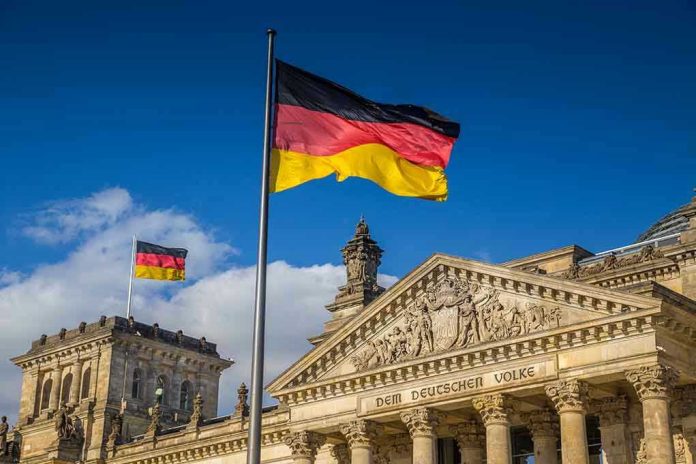
Germany’s dramatic shift towards military rearmament might just be the catalyst that reshapes the entire European defense landscape.
At a Glance
- Germany is accelerating its military procurement in response to Russian threats.
- The German government aims to make the Bundeswehr the strongest army in Europe.
- A recent suspected Russian sabotage attack heightens security concerns in Germany.
- Germany’s military expansion could alter the balance within NATO and the EU.
Germany’s Military Shift: A New Era
Germany is taking unprecedented steps in ramping up its military capabilities, a move that signals a profound change in its defense policy. This shift is in direct response to increasing security concerns, particularly with Russia’s aggressive military posture. The German government, under Chancellor Friedrich Merz, has committed to transforming the Bundeswehr into the most formidable conventional army in Europe. This decision comes amidst a backdrop of instability and wavering US security commitments to Europe.
The catalyst for this dramatic turn was the 2022 invasion of Ukraine by Russia, which marked a turning point for Germany. The then-Chancellor Olaf Scholz initiated a historic policy shift, introducing a €100 billion fund to strengthen the German armed forces. Since then, Germany’s defense strategy has been on a steady path of modernization and increased spending, reversing decades of underinvestment.
Current Developments: Lightning Speed Procurement
The German government recently approved a draft bill to expedite military procurement processes. This legislation allows defense firms to receive advance payments, enabling them to start production sooner. The Bundeswehr’s procurement list includes heavy equipment like Skyranger anti-aircraft tanks. The government also plans to recruit 50,000 to 60,000 new soldiers with the goal of expanding the force to over 203,000 by 2031.
Amid these developments, a suspected Russian sabotage attack on a Bundeswehr facility in Erfurt has raised alarm. This incident, involving the destruction of military transport trucks, exemplifies the hybrid threats Germany faces. The attack underscores the urgent need for robust security measures to protect military assets and personnel.
Implications for NATO and Global Security
Germany’s rearmament is poised to shift power dynamics within NATO and the broader European context. As Europe’s largest economy, Germany’s military posture is crucial for continental security. The ongoing enhancements to its defense capabilities might position Germany as a leading military power in Europe, potentially reshaping intra-European power balances.
While this move bolsters deterrence against Russian aggression, there is a risk of escalating tensions and triggering an arms race. Analysts warn that rapid militarization could provoke further Russian hostility. Nonetheless, Germany’s defense expansion is viewed by many as a necessary step to ensure European security and autonomy, especially given the shifting reliability of US security guarantees.
Looking Ahead: Challenges and Opportunities
Germany’s ambitious defense plans present both challenges and opportunities. The rapid pace of modernization requires efficient procurement processes, which have historically been plagued by bureaucratic delays. The defense industry will see increased demand for advanced military technology, potentially spurring innovation and economic activity.
However, this military buildup will inevitably spark political debates over military spending and its implications for civil liberties. The financial burden of defense expansion may also strain public finances and compete with other budget priorities. Societal anxiety over security threats and potential escalation with Russia will continue to be a concern.
Sources:
DW: Germany neither at peace nor war with Russia: defense chief
Daily Sabah: German military has 3 years to prepare against possible Russia attack



